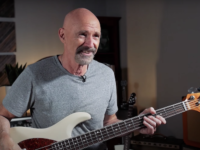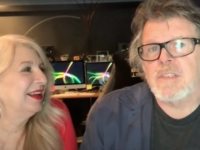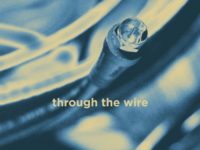The latest incarnation for bassist Tony Levin, best known for his work with King Crimson and Peter Gabriel, is as part of a fearless new trio album with guitarist David Torn and Yes drummer Alan White. Part prog, part free-form improvisational music, part noise rock, Levin Torn White brings in each of their familiar textures and sounds, yet sounds somehow completely new.
Both White and Levin have ties back to John Lennon, with the drummer performing on Live Peace in Toronto and Imagine in 1969-71, while Levin played with Lennon on his final two studio releases, Double Fantasy and Milk and Honey in 1980-83. Levin first met David Torn on the guitarist’s 1987 release Cloud About Mercury, then later worked with Torn as part of the Bruford Levin Upper Extremities project.
[ONE TRACK MIND: Legendary rock bassist Tony Levin digs into key cuts recorded alongside the likes of Peter Gabriel, King Crimson, Yes, Paul Simon and others.]
Along the way, Levin has performed with everyone from Pink Floyd to Buddy Rich, from Herbie Mann to Paul Simon. Levin has also released a series of well-received solo recordings — including Waters of Eden and the Grammy-nominated Pieces of the Sun — with Jerry Marotta and Larry Fast, cohorts from Peter Gabriel’s band. Sprinkled in between have been a series of live dates with the Stick Men, a group featuring Crimson drummer Pat Mastelotto and touch guitarist Markus Reuter. In fact, this week Levin is launching a long-awaited return to King Crimson’s mid-1990s double-trio experiment, on an upcoming tour starring the Stick Men and Crimson bandmate Adrian Belew’s Power Trio.
In another entertaining SER Sitdown, the busy bassist talks about the new Levin Torn White album, produced for Lazy Bones Recordings by Scott Schorr, as well as a few landmark moments from his fascinating career …
Nick DeRiso: The new album Levin Torn White uses volume and distortion almost as additional members of the trio. What was it like to play in such a boisterous environment?
Tony Levin: Good question about the distortion. There was a lot of it on this project. My opinion is that we just hear what the music is like, then respond the way our musical sense tells us to. In this case, it was with some heavy, gritty sounds. It wasn’t a plan at all; just the way the music took us.
DeRiso: Torn has a lot in common with Robert Fripp, your King Crimson cohort, in that he’s developed a style that’s so full of textures and effects. What is it that draws you to that kind of guitar sound?
Levin: He’s well known for the textural things he does, and he has many distinctive guitar sounds — and unidentifiable sounds — that he can bring to the music. I wouldn’t say I think of David and Robert in the same way, but certainly both players are unique voices.
[SOMETHING ELSE! REVIEW: The trio recording ‘Levin Torn White’ showcases a group every bit as capable as Levin’s old employer, King Crimson, but more intent on having some straight-up fun.]
DeRiso You and Alan White also share a history of playing with John Lennon, but on separate ends of his solo career. Do you guys ever talk about that time?
Levin: We haven’t compared notes — though we were almost together in a worldwide televised version of “Imagine” from China a few years ago. I was too busy touring to accept that opportunity. Playing with John, that was great — an honor and a huge musical pleasure for me. Not a lot to report about it except that, of course, I wish there had been more.
DeRiso: I found both Waters of Eden and Pieces of the Sun from the last decade endlessly fascinating, if only because the lead bass work seems to mesh so seamlessly with the other instruments.
Levin: Those albums were a pleasure to make — not only because I was making music with players I’ve spent years playing with, but being with old friends and having fun amidst making music. It really wasn’t an effort at all — just getting together and doing what we love to do.
[SOMETHING ELSE! REWIND: In spite of its brief existence, Bruford Levin Upper Extremities was a supergroup that for the most part lived up to the billing.]
DeRiso: The post-Crimson band ProjeKct One emerged in the late 1990s with an interesting tilt toward straight-ahead jazz. Was that a nod to the acoustic settings that Bill Bruford apparently always favored?
Levin: I didn’t feel it was jazz we played, but total improv music. That can weave in and out of rock or jazz. Who can define what jazz is, anyway? We had no parameters for what we would play, except not to practice or even discuss it before hitting the stage. Great fun. I did similar ‘total improv’ in a few tours last year by a band we call HoBoLeMa — Terry Bozzio, Alan Holdsworth, Pat Mastelotto and myself.
DeRiso: The risk taking involved with King Crimson’s music has to be exciting. At the same time, it leads to lengthy layoffs like the one the band is going through right now — almost like a recharging period. Are you planning on working with Fripp again?
Levin: I can only hope that Robert feels good about touring or recording with Crimson in the future. ‘Til then, I’ll keep plenty busy doing other projects, and with my band Stick Men. We do tour a lot.
- How Deep Cuts on ‘Music From Big Pink’ Underscore the Band’s Triumph - July 31, 2023
- How ‘Islands’ Signaled the Sad End of the Band’s Five-Man Edition - March 15, 2022
- The Band’s ‘Christmas Must Be Tonight’ Remains an Unjustly Overlooked Holiday Classic - December 25, 2016




